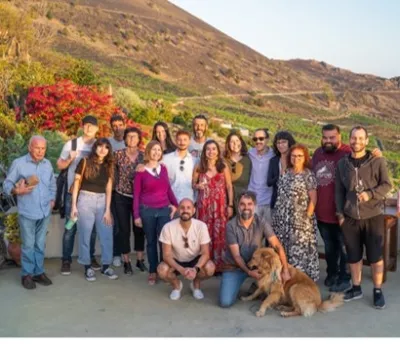Summary
‘Remote Villages’ (Spanish: ‘Pueblos Remotos’) is a social economy enterprise created in the Canary Islands (Spain) in the aftermath of the COVID-19 pandemic to look at remote work and rurality in a different way.
It consists of an innovative tourism development model to reactivate rural areas by attracting small groups of remote workers to enjoy a rural experience, which includes collaborating with rural entrepreneurs. These, in turn, benefit from the ideas and skills the remote workers share with them.
The model was first tested in three villages (Fuencaliente, Antigua and Icod), attracting around 30 remote workers in the period 2021-2022, creating 18 new tourism products and generating over 40 000 EUR as a direct economic contribution to the rural community.
Results
The project has proved there is a market for this type of experience and shown how local entrepreneurs can benefit from it, beyond the direct economic impact. Around 30 remote workers from five different nationalities and 18 rural entrepreneurs collaborated in a total of 39 'challenges' based on the needs of the local entrepreneurs (improvement of their existing websites or their tracking systems, social media strategy planning, new branding, market studies, etc.).
Over 80 ideas were analysed and, finally, 18 new tourism products were co-created to help diversify the economic model of rural areas (e.g. seeds workshop in an eco-farm and wine tasting tour around the vineyards of an ecological winery).
The initiative set up between three and five partnerships with public (local and regional administration) and local private stakeholders (accommodation providers, catering services, transportation companies, tourism businesses) for each of the experiences.
New editions are being organised not only in the same locations, but in 2023, the initiative is present in seven rural areas in the Canary Islands and other Spanish regions.
In 2022, 'Remote Villages' was selected for 'The Break', a women entrepreneurship programme, financed with Next Generation EU funds. The municipality of Agaete with 5 600 inhabitants hosted the activities among local actors and 21 female entrepreneurs living across the EU during the period October-November 2022.
Resources
Documents
Context
Fuencaliente, Antigua and Icod are three towns located on different Canary Islands with a vast rural and natural space. Since 2021, they have been part of a successful pilot project initiated by two entrepreneurs who wanted to address two main challenges:
-
The lack of visibility of rural destinations and their entrepreneurs: they observed the difficulties that entrepreneurs encounter in rural areas with giving visibility to the projects, products and services they offer due to a lack of capacity and resources.
-
The lack of a support system for rural entrepreneurs who tend to work in an isolated way on their projects, which prevents them from benefitting from knowledge and support from peers.
The 'Remote Villages' initiative was created to enhance the visibility of rural destinations and the support for their entrepreneurs through the advantages of remote work.
Objectives
-
To demonstrate that there is a different approach to tourism by organising sustainable tourism experiences in rural areas. This involves bringing together remote workers and rural entrepreneurs for a period of 21 days to co-create specific activities and products with a positive, long-term impact in the rural area.
-
To create a new rural narrative by showcasing rural areas and their entrepreneurs through communication campaigns, highlighting their offers and giving them more visibility.
-
To foster a 'Connected Rurality' by connecting remote workers with rural entrepreneurs, facilitating opportunities for synergies and collaboration through organised activities.
Activities, key actors, and timeline
'Remote Villages' offers a unique opportunity to work remotely in a rural setting, engage in local activities, and take part in a 'challenge' aimed at connecting participants with authentic rural innovators and collaboratively addressing local needs.
The duration of the programme is three weeks and typically involves 8-12 remote workers and at least three entrepreneurs from the municipality (artisans, winemakers, farmers, etc.) with sustainable business models.
The initiative provides accommodation (including high-speed internet connection) in a rural environment, traditional meals and a wide range of daily activities (workshops led by the local entrepreneurs, focus groups, team building, mindfulness and skills sharing sessions, and social events).
Success factors/Lessons learnt
The success of this rural tourism model consists in the creation of strong partnerships with local entrepreneurs committed to aligning their businesses with the Sustainable Development Goals and open to engaging with remote workers in a co-creation process.
The rich offer provided by the local entrepreneurs and the campaigns carried out by 'Remote Villages', showing the attractiveness of the rural environment where the experiences take place, attracted visitors interested in a different, more sustainable tourist experience where they can become rural innovators.
As a social economy enterprise, around 75% of the budget is re-invested, fostering sustainable development and a positive socio-economic impact that lasts in the rural areas where the project operates.
Contacts
Elsa Rodrígues, co-founder 'Pueblos Remotos': elsa@pueblosremotos.com

